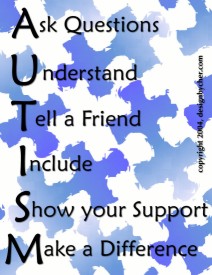|
Problems may include:
Behavior and Sensory Issues
Some individuals with autism appear perfectly normal; however, they spend their time
engaged in puzzling and disturbing behaviord different from those of normal children. Some of those behaviors include:
uncontrollable tantrums, toe walking, hand flapping, finger flicking, body rocking, pursuing strange and repetitive activities
with no apparent purpose, staring into space, showing no interest in people (even their own family members), lack of eye contact,
sensitivity to touch, sound, and bright lights and insensitivity to pain.
Individuals with autism can have many and varied symptoms.
Those symptoms would include mental retardation, speech and language problems, sensory
issues, social problems, seizures, bowel and intestinal problems, eating issues, allergies, and sleep problems. The
degree of intensity differs greatly among those with autism.
Communications may be difficult.
Children with autism seem to have compromised expressive and receptive communication.
In addition to other skills, they seem to lose developmentally attained communication skills. They may lose speech completely
or develop repetitive speech patterns called echolalia.
People with autism may have impaired social interaction, and lack of imagination.
They fail to develop peer relationships and often lack the ability to initiate and sustain conversations with others.
|

